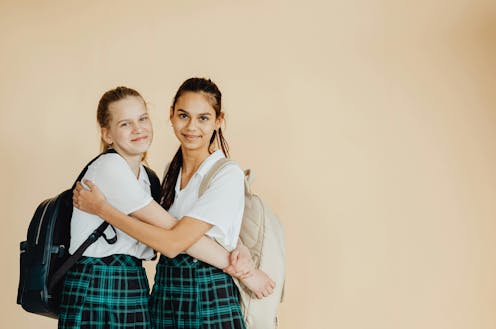Is your child’s photo on their school Facebook page? What does this mean for their privacy?
- Written by Karley Beckman, Senior Lecturer in Digital Technologies for Learning, University of Wollongong

If you search most primary or high school websites, you will likely find a images of happy, smiling children.
Students images are also used publicly for school newsletters, social media accounts and other school publications like annual reports.
Parents could reasonably expect schools and educations departments have conducted thorough checks and evaluations to do this. To some degree this is true, but a recent AI scare where children’s images were used in a massive training data set included some photos from school websites.
Research also shows schools can do more to promote children’s rights to privacy.
Parents and governments are already concerned about children’s safety online. As part of this, we need to look more closely at how students’ information and images are being used by their schools.
Why is online information an issue?
Publication of children’s images and personal information on social media platforms generates a trail of information or profile of that child. This information is permanent and may have implications for children now and in the future, including on their self-esteem.
This data also contributes to a “digital shadow”. This is the digital data associated with individuals we cannot see. It can can be sold and used to profile and target individuals for advertising or dictate what information and content we see online through recommender systems.
What are schools required to do?
In Australia, the publication of a child’s personal data, which includes images and video, is protected by the Australian Privacy Principles. This is underpinned by the Privacy Act or state and territory privacy laws.
This means all schools need to have the consent of the child and/or their parent/caregiver to publish images, videos and personal information on learning platforms, school websites, advertising and social media accounts and in school newsletters and news media.
This is why parents are asked to sign a “consent to publish” form, usually at the start of each school year.
Privacy laws outline how consent needs to be voluntary, current and provide sufficient and specific information about the different uses of personal data.
But publicly available policies show schools differ in the way they inform parents about the uses of children’s data. This is because Australia has a state-based education system with a variety of school types that are all governed differently.
While current policies may align with federal and state laws, they do not necessarily promote children’s right to privacy or consider their best interests considered. There are three issues that need more attention.
1. More specific consent
At the moment we don’t have enough detail about the different ways children’s data is handled across different platforms.
For example, publishing a photo of a child will have different privacy risks, if it’s published on a school’s Facebook page, on a class learning platform or in a hard-copy school newsletter.
Parents should be able to refuse consent in one context but provide it for another.
2. What happens if you say no?
We also don’t have a clear understanding about how schools deal with children of families who do not consent
We know there is some increased work for teachers to identify children who do not consent and without clearly communicated procedures there is uncertainty about how to engage with and manage online publication processes. For example, how does a teacher treat a non-consenting child when taking a whole class photo?
There are also reports children can be excluded from some school experiences, such as large music and dance performances.
3. Do students have a say?
The eSafety Commissioner says adults should seek consent from children of all ages when taking their photo or video and explain the purpose.
This is something we also teach children as part of consent education as they get older.
But many current policies do not require children to give their consent. Nor do they require schools to talk to students about what consent means if an image is used online. This is because it is assumed many students are too young to understand.
This suggests current approaches around gaining consent are more about legal compliance, rather than truly promoting children’s rights to privacy.
What should schools do differently?
This is not a question for individual schools to solve on their own. This issue needs to be tackled by governments, education departments and independent school associations (who represent private schools). Education departments and associations can review existing policies to:
improve schools’ understanding of the way images/videos are used by platforms
improve communication with families about this information
provide clearer procedures for non-consenting children, developed in partnership with families
improve children’s capacity to understand consent around the way their image is used as a part of digital literacy education.
What can parents do?
Parents and teachers can model safe and healthy digital habits. If you are taking an image of a child, ask for verbal consent and explain your purpose. For example, “is it OK if I talk this photo of you, I want to show Grandma how you look in your soccer uniform.”
For parents and caregivers who sign consent to publish forms, it is perfectly reasonable to have questions or concerns. If you have any doubts about how your child’s images or data will be used, talk to your school.
Authors: Karley Beckman, Senior Lecturer in Digital Technologies for Learning, University of Wollongong



















